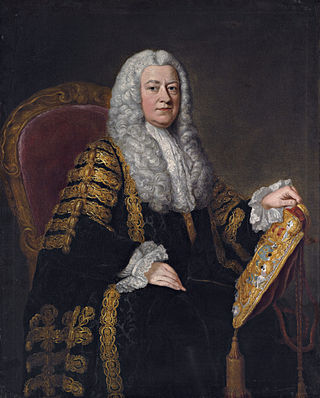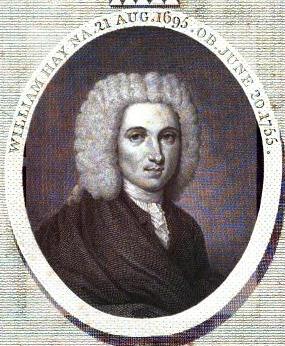Contents
Other years |
| Countries of the United Kingdom |
| Scotland |
| Sport |
| 1753 English cricket season |
Events from the year 1753 in Great Britain.
Other years |
| Countries of the United Kingdom |
| Scotland |
| Sport |
| 1753 English cricket season |
Events from the year 1753 in Great Britain.

1754 (MDCCLIV) was a common year starting on Tuesday of the Gregorian calendar and a common year starting on Saturday of the Julian calendar, the 1754th year of the Common Era (CE) and Anno Domini (AD) designations, the 754th year of the 2nd millennium, the 54th year of the 18th century, and the 5th year of the 1750s decade. As of the start of 1754, the Gregorian calendar was 11 days ahead of the Julian calendar, which remained in localized use until 1923.

1753 (MDCCLIII) was a common year starting on Monday of the Gregorian calendar and a common year starting on Friday of the Julian calendar, the 1753rd year of the Common Era (CE) and Anno Domini (AD) designations, the 753rd year of the 2nd millennium, the 53rd year of the 18th century, and the 4th year of the 1750s decade. As of the start of 1753, the Gregorian calendar was 11 days ahead of the Julian calendar, which remained in localized use until 1923.

Henry Pelham was a British Whig statesman who served as Prime Minister of Great Britain from 1743 until his death in 1754. He was the younger brother of Thomas Pelham-Holles, 1st Duke of Newcastle, who served in Pelham's government and succeeded him as prime minister. Pelham is generally considered to have been Britain's third prime minister, after Robert Walpole and the Earl of Wilmington.
This article contains information about the literary events and publications of 1753.
This article contains information about the literary events and publications of 1754.

William Coxe was an English historian and priest who served as a travelling companion and tutor to nobility from 1771 to 1786. He wrote numerous historical works and travel chronicles. Ordained a deacon in 1771, he served as a rector and then archdeacon of Bemerton near Salisbury from 1786 until his death.

Philip Yorke, 1st Earl of Hardwicke, was an English lawyer and politician who served as Lord High Chancellor of Great Britain. He was a close confidant of the Duke of Newcastle, Prime Minister between 1754 and 1756 and 1757 until 1762.

The Jewish Naturalisation Act 1753 was an Act of Parliament which allowed Jews resident in Britain to become naturalised by application to Parliament. It received royal assent on 7 July 1753 but was repealed in 1754 due to widespread opposition to its provisions.

Robert Ward, or from 1828 Robert Plumer Ward, was an English barrister, politician, and novelist. George Canning said that his law books were as pleasant as novels, and his novels as dull as law books.
Events from the year 1828 in the United Kingdom.
Events from the year 1836 in the United Kingdom.
There have been three baronetcies created for members of the Anstruther family, two in the Baronetage of Nova Scotia and one in the Baronetage of Great Britain. Two of the creations are extant while one is extinct.
Events from the year 1825 in the United Kingdom.
Events from the year 1748 in Great Britain.
Events from the year 1752 in Great Britain.
Events from the year 1754 in Great Britain.
Events from the year 1694 in England.

William Hay (1695–1755), of Glyndebourne, Sussex was an English writer and Whig politician who sat in the House of Commons from 1734 to 1755.
Events from the year 1753 in Scotland.
William Samuel Powell, D.D. (1717–1775) was an eighteenth century academic and priest, most notably Vice Chancellor of the University of Cambridge from 1765 until 1766; and Archdeacon of Colchester from 1766 until his death. He was elected as a Fellow of the Royal Society in 1764.